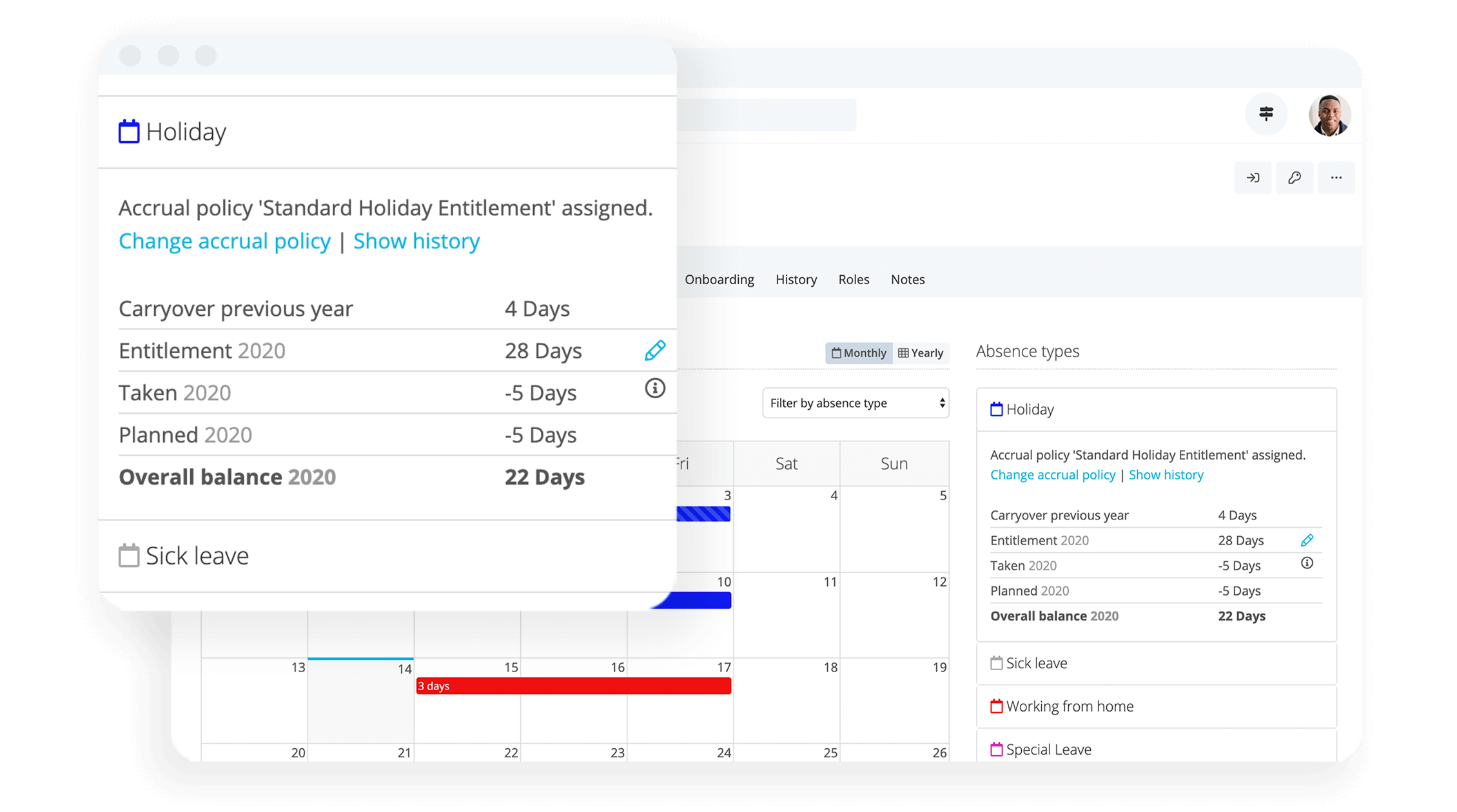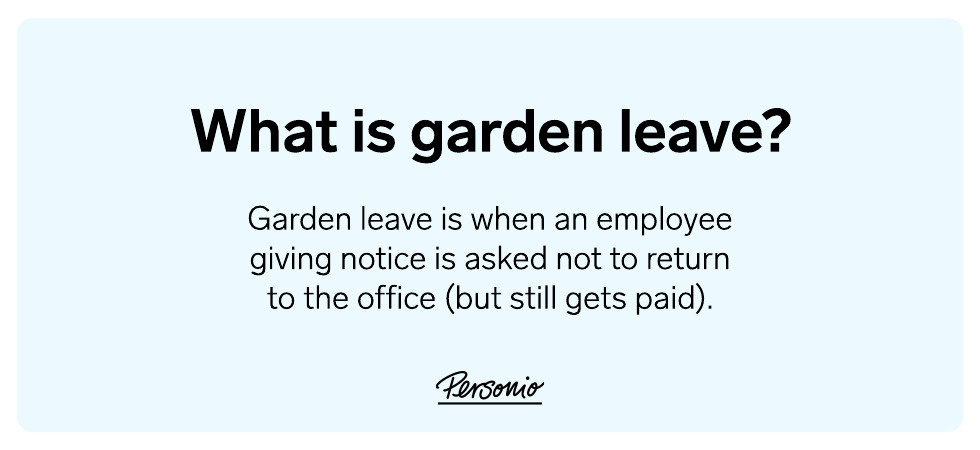
Absence Reporting Made Easy
Track availability across your organisation instantly.
Unlock 360° VisibilityLatest Blog Posts
What Is Garden Leave and Is It a Good Idea? Pros & Cons

Is garden leave, or gardening leave, a win-win for employees and employers alike? It’s not completely clear. In this article, we describe what garden leave is, if employers should consider putting an employee on this kind of leave, and when it can be the right thing to do.
While we’re here: Let’s talk about payment in lieu of notice (PILON).Contents
What Is Garden Leave?
Garden leave is a type of absence where an employee, upon giving notice of resignation, is requested not to return to the workplace but continues to receive pay. This period is taken in anticipation of the employee's departure from the company.
Where Does The Term Come From?
The term made its way into the dictionary in the mid-1980s and started being used by the general public after it was used on an episode of the BBC sitcom Yes, Prime Minister and in Silent Witness. From that point, it entered more everyday use.
Why Do We Call It Garden Leave?
Garden leave in the UK is a far different term than in the United States, which commonly uses the term ‘administrative leave.’ Some suggest that it’s given that name since people can’t work for their old employer or their new one during this time. As a result, all they can do with their time is work in the garden.
However you choose to call it, it’s a tool that companies in the UK can use once an employee has handed in their notice, to prevent them from coming into work or working from home or another location for a defined period of time.
Looking for the definitive guide to notice periods in the UK? Click here for more.
When Should Companies Consider Offering Garden Leave?
The ‘garden leave’ clause in an employment contract is most often used when an employee leaves to go and work for a competitor. This effectively provides a ‘buffer zone’ between their current job and their future one. Essentially, this prevents them from learning any confidential business information, so as not to share it with a competitor.
Putting an employee on gardening leave also helps someone taking on their previous role to do so without interference.
When on leave, employees are also excluded from receiving future-looking information that could potentially be valuable to another company – such as future business strategies. It also helps to document their absence as part of a staff holiday planner.
When Can HR Use Garden Leave?
When there is a specific clause in an employee contract, you have the enforceable right to require employees to take garden leave. However, this is only the case if the employee agrees in advance, and ideally in writing.
A gardening leave clause may be triggered when:
Reason | Why |
|---|---|
Privacy & Security Concerns | You want to restrict an employee’s access to company information immediately. |
Professional Preference | The employee has been dismissed (or has resigned) but you don’t want them to come to work during their notice period, or start a new job during this period either. |
Contract Clause Reasons | There is a ‘post-termination period’ in the contract (i.e. clauses that say what they can or can’t do after they’ve handed in their notice), but this might not be enforceable. |
In these circumstances, there’s usually a bit of a cloud surrounding the employee’s departure. Often the company is angry that an employee is leaving (especially if they’re going to join a competitor) and wants them ‘out of their sight.’
Gardening leave, though, can also be used when employees leave under good terms. For example, employees can negotiate that some of their notice be used as gardening leave time, as long as the company agrees, too.
Can You Always Put An Employee On Gardening Leave?
As it happens, not really. Rocketlawyer says that "Without advance agreement, putting an employee on garden leave is technically a breach of contract and they may be able to treat themselves as dismissed and immediately released from their employment, free to take up a new job.”
So, as in most HR-related issues – if you think it’s important to be able to give employees garden leave, make sure you put it in the contract they sign when they join the company.
Enjoy our guide to holiday pay and holiday entitlement in the UK today.
A Better Way To Manage Leave

Request and track absences across your organisation and see availability at a glance, broken down by department, role and more.
Manage Absences With PersonioWhat Does gov.uk Say About Gardening Leave?
The official UK government advice website, gov.uk, says that employees are entitled to the same pay and contractual benefits during this period of time. While the gov.uk website does not explicitly link gardening leave to restrictive covenants, they do list these as an important part of the process of handing in notice when leaving a job.
It’s also no coincidence that they remind employees when they hand in their resignation that, “There may be terms in your contract that says you can’t work for a competitor or have contact with customers for a period of time after you leave the company. These are called ‘restrictive covenants.’ Your company could take you to court if you breach the restrictive covenants in your contract.”
What Happens When Employees Are On Gardening Leave?
From an employers’ perspective, not much happens. The employee is still required to agree by the terms of his or her contract of employment and they literally do no work! Most importantly, though, they also may not share any information during this time.
More generally, they can’t go to the office or other company premises and can’t communicate with colleagues, clients or suppliers. They are also cut off from having access to company documents.
When Is Garden Leave Right For Your Business?
As with many HR issues that aren’t completely clear, in a legal sense, it’s pretty much up to you to decide when to invoke a gardening leave clause
Essentially, employees are asked (or forced) to take garden leave when there are concerns about confidentiality. The idea is to prevent the employee from working for you or for a competitor long enough for any confidential knowledge they have to become out of date.
It is generally considered that garden leave up to six months is acceptable, but a company’s ability to enforce this depends on several factors, including:
What it says in the employee’s contract.
What sort of a role they may play in your business (if they don’t have access to confidential information, it’s unlikely that gardening leave will be necessary).
How senior they are (for the same reasons).
Whether it makes financial sense (and your company has the resources) to do so.
What Are An Employee’s Rights During Garden Leave?
Don’t forget that employees do continue to accrue leave while they’re on garden leave – but you can require them to take leave during their notice period, so this usually all works out without too much fuss.
Employees on garden leave also continue to be entitled to any statutory benefits – including statutory sick leave, parental leave and pay, the right not to be discriminated against, statutory minimum wage, statutory minimum holiday, and statutory redundancy.
Who Is Typically Given Garden Leave?
Garden leave is often used for senior employees or those with access to sensitive business information. You might use a gardening leave clause when employees job roles like:
C-level executive positions (e.g. CEO, CIO, CHRO, CMO, CFO, etc.) and
Sales positions
Does Gardening Leave Have A Negative Impact On Company Culture?
It’s debatable. If an employee is a bit of a trouble-maker or was asked to leave but the company decided to pay garden leave rather than formally dismissing them, then having them out of the company may be good for morale, on balance.
However, employees talk, and scandal is generally not conducive to positive company culture.
When you put an employee on garden leave you have a choice to make:
You can either tell people about it, help them adjust to not having this employee around, and build (or re-build) relationships with clients, colleagues, or suppliers as quickly as possible.
The alternative is to usher them out of the company under a veil of secrecy. While this may protect your company’s interests, in that they are prevented from sharing any new information, it also creates a bad feeling around their departure.
Is Garden Leave A Bad Thing?
At the end of the day, giving an employee gardening leave is expensive and is only used in rare circumstances. However, it pays to be prepared. So make sure you have a garden leave clause in your contract, ensure the employee signs the contract and that you save it – safely and in a way that is easy to retrieve (for example, by using an online HR data storage solution like Personio) – and you’ll be ready if you ever need to use it.

